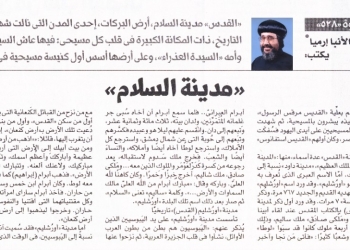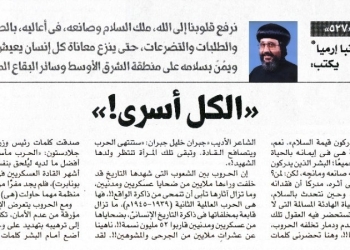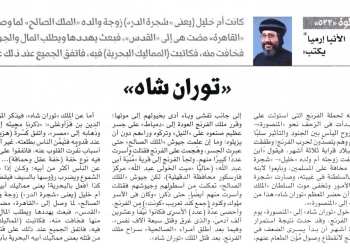Next week, the holy Apostles Fast will start. Thus, Egyptians share such spiritual occasions which make them close to God. Egyptians, by nature, love God, cling to spiritualities that have a deep impact on their hearts. For ages, they have been keen on knowing God and getting close to Him, honoring all spiritual toil. Thus, caring about spiritual practices is deeply rooted in the nature of Egyptians since the dawn of history.
Fasting is a spiritual practice which nurtures man’s heart, affecting both his life and conduct. This practice is promoted by all creeds and religions. In the Bible, we read, “Sanctify ye a fast, call a solemn assembly.” Likewise, we read in the Qora’n, “Should you get to know there is fasting, then better fast.”
The Dictionary Meaning of “Fasting”
According to “Al-Ma’any” Dictionary (The Dictionary of Meanings), fasting is abstaining from doing something. As per “Al-Waseet”, it means abstaining from any word or deed. Yet, fasting surpasses the dictionary meaning which has to do with its very physical aspect, that is, refraining from food and drink, to include refraining from bad deeds and evil thoughts. Thus, it becomes a fasting of the mind and soul.
While fasting, man acquires several virtues. Hence, fasting leads to learning endurance, strengthening one’s will, giving and becoming charitable. In effect, fasting is one of life’s crucial bases. It is important for spiritual growth. Reposed Pope Shenouda III said, “Fasting is not just a divine commandment. It is also a gift and blessing from God. God created man with a body and a spirit. So, He knows that we need fasting, and that fasting is a necessity in our spiritual lives for its benefit, growth, as well as our eternity. God has given us fasting as both a gift and commandment.”
Fasting is linked to prayers that strengthen one’s spirit and promote its relation with God. Likewise, fasting is linked to other virtues as:
-
Endurance
While fasting, man teaches himself endurance. Physically, man spends several hours without food and drink. These hours constitute a training for the body to endure hunger and thirst. Thus, it becomes more able to endure these feelings with time. Moreover, it trains the soul to acquire many virtues, such as enduring other people’s harsh words or conduct. In addition, one acquires the ability to control himself and not to plunge into anger. Henceforth, the soul gets gradually trained on restricting the mouth and preventing it from uttering angry words. The mind also becomes strong enough to resist evil thoughts. Thus, the body refrains from food and drink and the soul from sin.
As for the spirit, it soars, contemplating heavenly matters through a body that endures hunger and thirst and a soul that endures others’ mistakes and forgives them. It becomes strong. Therefore, through fasting, man acquires lots of physical and psychological virtues. He gradually grows spiritually. His relation with God, himself, and the others develops.
-
Strength of Will
Because fasting qualifies man to have endurance, with time, it becomes a lifestyle. Thus, it strengthens man’s will. A body trained to endure hunger and thirst for long periods of time has a strong will that enables the person to refuse many things that are morally and spiritually unsuitable for him. Likewise, a soul that has learned to endure can easily bear life’s hardships and tribulations, which is one of the foundations of success. Also, the spirit’s will becomes so strong as to cling to whatever makes it close to God. This is attained through prayer, worship, good deeds, mercy, tolerance, and forgiveness.
-
Giving
Inasmuch as fasting is linked to prayer, it is linked with giving, and the charity which man offers the needy. Fasting generates the feeling for others’ needs within man’s heart. Thus, it makes him kinder to the poor and needy, attempting to give them all sorts of help he can, and by all means. Charity does not spring from a sense of duty, but from an overflow of mercy and kindness that make man want to make others happy. The experiences one goes through while fasting make him more humane and sympathetic toward others, especially the poor, needy, and helpless. There once lived a rich man who used to dedicate a day in which he would experience the poor people’s hardships. He used to wear ragged clothes and stand in the rain to feel the same. He did not want to become vain or unkind due to his wealth. Thus, fasting makes people sympathize with one another. Subsequently, man’s deeds and behavior become more refined.
-
Good Deeds
Fasting motivates man to do good things. This is not bound to material issues. It extends to other things: one can give others an honest piece of advice. Likewise, one can encourage weak souls, teach another person something new in work or life, or make peace amongst people. Sharing other people’s sadness or happiness is a good deed. Whenever you listen to a person’s complaint or smile to a lonely person, their souls are deeply touched and positively affected. They can overcome the hardships of life and live well.
-
Honesty:









